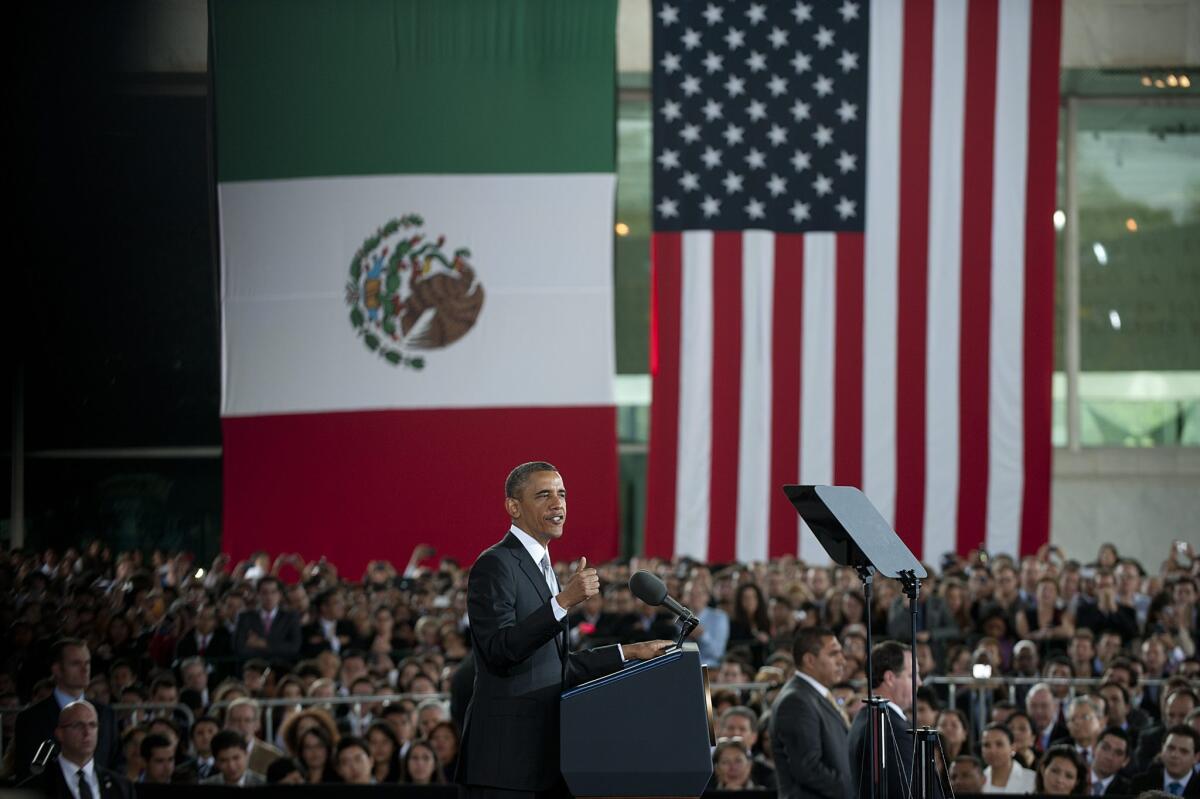Mexico âremakingâ itself, Obama tells students

MEXICO CITY -- President Obama painted a sunny picture of a modern, âemergingâ Mexico in a speech before an audience of young people Friday, his second day of a three-day swing through Latin America.
Speaking at the National Museum of Anthropology, the president expressed optimism about the push for reforms led by the new administration of President Enrique Peña Nieto and called on young people to be persistent.
âYou honor your heritage, thousands of years old, but you are also part of something new, a nation thatâs in the process of remaking itself,â Obama said, speaking in a central courtyard of the iconic museum with Mexican and American flags hanging behind him. âAnd as our modern world changes around us, it is the spirit of young people, your optimism and idealism, that will drive the world forward.â
The presidentâs message of a rising Mexico serves both his and his counterpartâs domestic agendas. Obama is pushing for immigration reform, and is seeking to reassure skeptics at home that the root causes of illegal immigration â poverty, violence and corrupt institutions in Mexico â are easing under new leadership.
Peña Nietoâs reform agenda could use the boost. After passing laws to overhaul education and telecommunications, he faces an uphill battle in opening up Mexicoâs energy sector, especially oil exploration, to foreign investment. Such a move has long been taboo here.
Obamaâs remarks might be viewed as premature. The Mexican economy has begun to slow and the decrease in illegal immigration is more likely a result of demographic changes, the sluggish U.S. economy and the severe dangers of crossing Mexico than any improvements inside Mexico.
But the president is eager to change the perception of Mexico and its relationship with the U.S. from one defined by security, violence and tensions on the border, to one of mutual gain.
âJust as Mexico is being transformed, so too are the ties between our two countries,â he said, calling on âtwo sovereign nationsâ to work together in mutual respect and mutual interest.
Obama noted the debt he owed to Latino voters at home, a voting bloc he won handily. Without their support, he said, âI would not be standing before you today as president of the United States.â
Obama described a Mexico that many Mexicans do not recognize. He praised a growing middle class when, in fact, economists say the middle class in Mexico has been stagnant for years, and violence has hurt the pocketbooks of many of those who barely emerged from poverty.
Obama lauded a courageous press that holds authorities accountable, when in fact violence and intimidation has silencedmost newspapers outside of Mexico City; they do not report on drug trafficking and other issues because of threats or bribes from criminals or local authorities.
His discourse, however, fits in with efforts by both Washington and the Peña Nieto administration to change the image of Mexico, regardless of the facts on the ground.
The speech also fit a common pattern for the president. Particularly when traveling to unstable or poor countries, Obama often opts to speak to young people -- an audience that allows him to look ahead to a hopeful future, rather than focusing on the present.
While it helps Obamaâs domestic agenda, for Peña Nieto, the new image also takes attention away from his indecision over how to fight powerful drug cartels and furthers his goal of bettering Mexicoâs position in the global marketplace.
After private meetings on Thursday with Peña Nieto, Obama chose Friday to deliver his single public speech to an audience selected from several universities and stress the role the students have in shaping Mexicoâs future. Mexico has one of the highest dropout rates in the developed world, and its abysmal educational system has long been blamed for reducing the countryâs ability to compete.
Following the remarks, Obama was due to meet privately with a group of Mexican entrepreneurs before departing for Costa Rica. In San Jose, the president is slated to meet with President Laura Chinchilla, along with the leaders of Honduras, Belize, Nicaragua, El Salvador, Panana and the Dominican Republic.
ALSO:
In China, rat meat is sold as lamb
Political calculus keeps Cuba on U.S. list of terror sponsors
Press Freedom Day: Where reporters and their work are threatened
More to Read
Sign up for Essential California
The most important California stories and recommendations in your inbox every morning.
You may occasionally receive promotional content from the Los Angeles Times.












